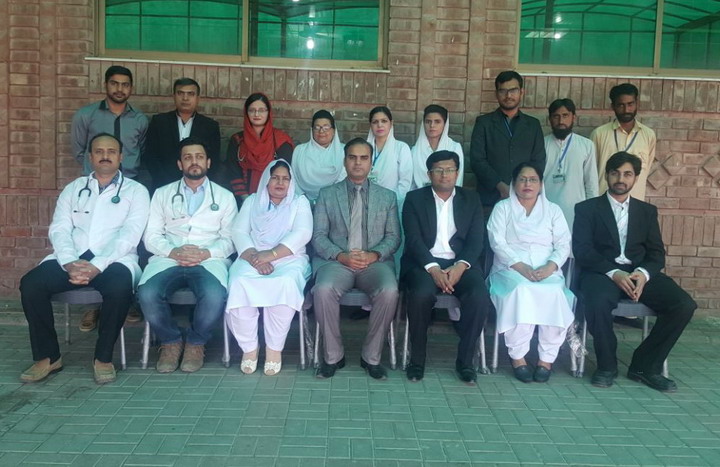|

Introduction:
The department of Nephrology at LGH
is one of the emerging units in Lahore. It was started in
October 2016 as a separate department under the
supervision of Dr. Augangzeb Afzal and leadership of Prof.
Ghias un Nabi Tayyab. Since the this unit continue to lead
the way of improving patient care.
It comprises of 12 inpatient beds
and 34 bedded HD units which is providing state of the art
medical care for our nephrology patient. Nephrology unit
is also providing 24 hour, emergency service as well as HD
facility for sick patient.
The department is also performing
renal biopsy and inserting temporary dialysis Catheter
under ultrasound guidance on regular basis. This is the
only unit in public sector which is offering service of
permanent Catheter insection.
There are regular academic
activities in this unit which include classes of HD
technician, regular academic rounds, weekly classes for
postgraduate trainees and journal club. Extensive research
program is being carried out in this department.
Nephrology unit is seriously and effectively working with
urology department to carry out renal transplant in LGH
which will soon be started. We have 7 publications this
year and 5 more in the pipeline. Although a new department
with a lot of challenges, it has very dedicated and
effective team under leadership of Dr. Aurangzeb Afzal and
are determined to make this unit on of the best kidney
care providing unit in Pakistan. Aim is to initiate CRRT,
CVVHD, CAPD plasmapheresis under nephrology department.
Prestatus:
Hemodialysis unit at Lahore General
Hospital was 1st established in 1985, with just two
dialysis machines. Further machines were later on added to
pool and by the end of 2012, the number of functional
machines were sixteen. Later sixteen more machines were
provided to the unit by some philanthropist, increasing
the number of machines to thirty two(32).
As there was no nephrology unit ,so
it was initially run under care of urology department. As
nephrology services are mandatory for the running of
dialysis centre and to handle patients of nephrology in
LGH,thus a NEPHROLOGIST was appointed in LGH in 2015.
Initially outdoor and indoor calls services were started
Later a 12 bed area was also allocated to start indoor
services . With growing needs LGH had reached to a verge
where an independent nephrology department was required
for handling the nephrology patients in LGH hospital and
dialysis centre to provide much demanded facilities to the
public.
Keeping in view this inevitable
necessity of LGH,A PC1 for state of the art Nephrology
ward was submitted. Immediately afterwards nephrology
department claimed its recognition as CPSP/UHS/PGMI
approved training facility. Now we have the third largest
hemodialysis unit in Punjab which is maintained with
inevitable assistance of Nephrology Department.
There is a staggering increase in
the number of patients per year.There are two reasons for
that:
1) The catchment area population of
General hospital has almost tripled in the last one
decade.
2) The number of patients of Chronic
kidney disease are multiplying each year.
The need of the hour is to treat
these patients with kidney diseases and prevent them from
going to long term haemodialysis. This will not just be a
service to patients of this region, it will also help to
decrease the financial burden on the government in the
future.The approximate expenditure on a patient of
dialysis per month is almost fifty thousand. These
patients can only be treated properly and prevented from
going to longterm haemodialysis if our team have
enthusiastic and realistic goals and resources.
Present Status:
Currently we are providing services
of nephrology to patients and statistics show that the
trend of patients seeking nephrology consultation is
increasing in LGH day by day.
MSDS & Infection Control:
The standard operating procedures
according to “MATERIAL SAFETY DATA SHEET' "as laid down by
health care commission are implemented in Nephrology
department according to all available resources. The core
aspects have been addressed and the lagging areas are
being worked out to implement MSDS in its true spirit.
FRAMING OF STANDARD OPERATING
PROCEDURE FOR INFECTION CONTROL IN PROCEDURE ROOM
ACCORDING TO MSDS GUIDELINES FOR :
-
Central veinous catheter
-
Temporary double lumen catheter
-
Permanent double lumen catheter
-
Renal biopsy
-
Peritoneal dialysis catheter.
-
Seminar arranged for infection
control in nephrology department
Awareness of safety measures and
implementation of safe clinical practices are being
highlighted as an ongoing process in health professionals
and public
Departmental Activities:
Curricular activities:
Routine:
Conferences:
-
World Kidney Day
-
PSN conference
-
CAPD conference
Co-curricular activities:
-
Doctor of the month
-
Wall of research
Extra curricular
activities:
Future goals:
Establishment of satellite dialysis
rooms on surgical and medical floors with round the clock
supervision of nephrologists Expansion of OPD facilities
In future we are looking forward for induction of faculty
and residents. There is also a need for increase in
strength of beds to cope up with the patient turnout. The
PC1 awaits approval to expand Nephrology department into
one of the state of the art facility in Lahore. We are
working in Laison with pathology department to establish
in-house histopathology of renal biopsy samples To strive
for gain of resources and spread awareness in our
department specifically and in LGH in general for
implementation of MSDS in its true spirit. Facilitation of
Post Graduate trainees by accumulation of resources that
are helpful in their academics. Arrangements for clinical
rotations of upcoming medical students in nephrology.
|